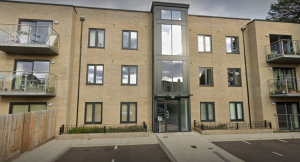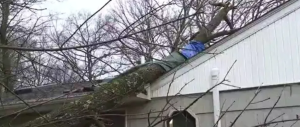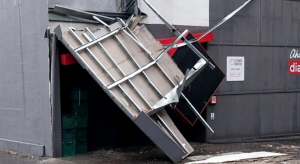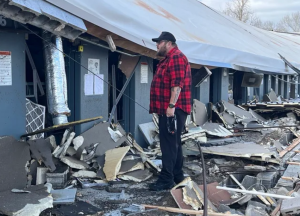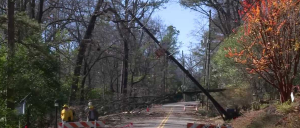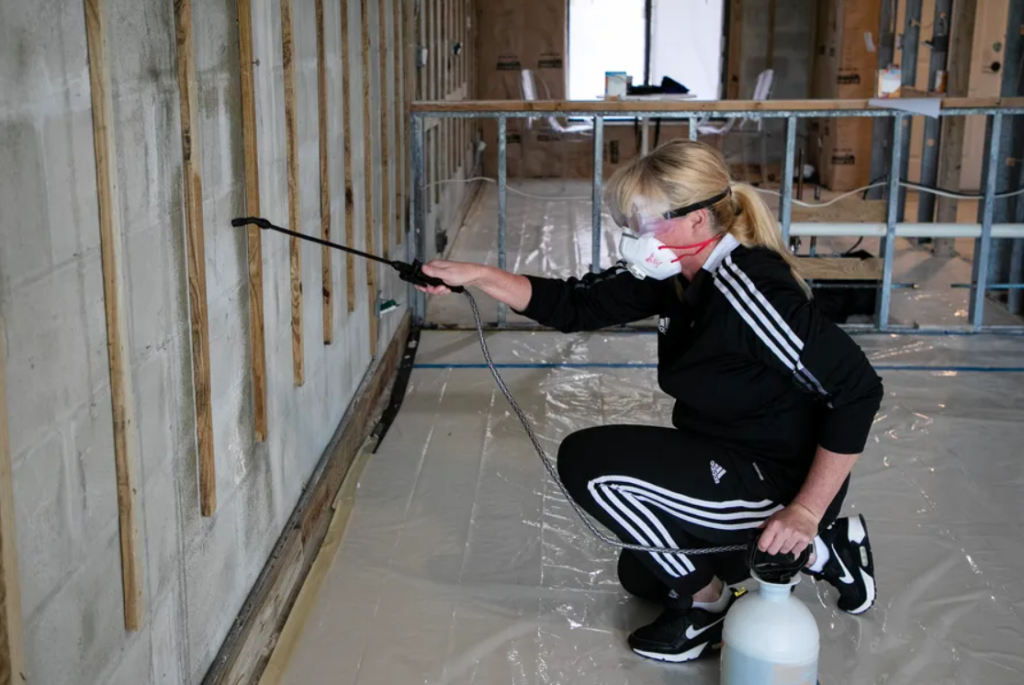
By Kate Cimini
The incident began in the master bedroom.
145-mph winds tore the roof off Sara Alvarez and Justin Jackson’s home when Hurricane Ian battered Southwest Florida, battering homes and dumping rain.
The rain poured in, sopping belongings, walls, and floors. Despite Jackson’s efforts to remove the water from the ceiling with a Shop-Vac, the ground floor was covered in 2 inches of water by the time the storm had passed as the wind battered the townhouse for hours.
Alvarez, who works from home, developed daylong headaches and flu-like symptoms as mold grew in the paths water had carved in the walls.
That was just the beginning.
In Phase VI of Parkwoods in south Fort Myers, the homeowner’s association’s insurance company refused to pay $2 million for emergency repairs for the couple’s and 67 other townhouses after a contractor tore out their moldy walls. Hundreds of families were left with half-gutted houses as a result.
Floridians aren’t the only ones left stranded by Heritage Casualty & Property Insurance, state records show.
There are still many Floridians who are not recovering from the last hurricane season despite the fact that the next hurricane season is well underway. They complain that their carriers delay payments, lowball customers or refuse to pay them. Consumers and their advocates claim the state doesn’t do enough to help them and is soft on insurers and insurer crime.
In the wake of Hurricane Ian, more than 4,000 residential owners filed complaints with the state against their carriers.
Residential property owners have complained 17 times since January that their coverage has been extended, they have received additional payments, or their claims have been reopened. Consumer attorneys are getting more help as insurers leave the state, premiums rise, and homes are still in disrepair.
Since Ian, “everyone’s got a problem where they’re either not getting enough or they’re not going to cover their costs,” said Fort Myers consumer lawyer Michael McQuagge.
It’s not just one bad apple – it’s happening to all insurers.
As soon as Ian left Lee County, tracking northeast, SouthernCAT came and tore down drywall throughout Parkwood townhomes. The workers hung huge fans to dry the mold, and welded gray tarps on the roof. After warning the residents the tarps were only to be used for a few months, they left, planning to rebuild the walls and roofs in the near future.
Despite being past Florida law’s 90-day period for insurers to pay legitimate claims, Heritage refused to pay out for SouthernCAT’s work until July of the following year.
SouthernCAT stopped working on those townhomes after months of nonpayment, Lee County records show. SouthernCAT did not return multiple requests for comment.
Parkwoods was also low-balled on the cost of restoring the damaged townhouses to their original condition by Heritage. After the homeowner’s association filed a complaint with the state, it offered only $1.4 million out of two claims totaling $12 million.
When contacted by a reporter, Heritage’s Vice President of Claims Joe Powers said he didn’t know about the Parkwoods situation but that it was now his “biggest concern” and Heritage would be sure to pay out the emergency claim. The company was also promised to revisit the $10 million claim by him.
It’s little comfort for the thousands of homeowners in Florida whose own insurers have yet to act.
Complaints are piling up
There has been a gradual strangling of Florida’s property insurance market in recent years. There is an increase in insurance premiums, insurers are going bankrupt or have stopped writing policies, and the state’s storms are getting wetter and more intense as a result of climate change. A lowball offer or a denial of a claim can decimate a homeowner because inflation makes it more expensive to rebuild after damage.
It is rare for consumers to file a lawsuit or complain to the state against their carriers. Recently, new barriers have been erected to filing a lawsuit, and there is no guarantee that a complaint will be successful.
Records of complaints consumers filed against their property insurance carriers since January confirmed McQuagge’s claim.
Over 12,000 complaints against carriers have been received by Florida Chief Financial Officer Jimmy Patronis since January, but 4,173 cite Hurricane Ian as the cause of residential property damage. Two-thirds -– or 2,525 -– of these complaints involve a delayed claim, an underpayment, or an unresponsive carrier.
There are 60% of complaints about too-low or too-slow payouts in Lee, Collier, and Charlotte counties, which were the hardest hit by the hurricane.
A number of complaints were filed against Citizens Property Insurance Corporation, but American Integrity Insurance Company of Florida collected the most complaints about claim delays and American Traditions Insurance Company received the most complaints about underpayments, according to records.
As more carriers have policies in the areas affected by Ian, they may see more complaints filed against them, said Patronis’ communications director Devin Galetta.
Since October 2022, Heritage, the carrier insuring Parkwoods VI, has received 683 complaints. More than a third of these are related to Hurricane Ian.
I requested an interview with the Office of Insurance Regulation, which investigates insurer fraud on the market. In an email, Samantha Becquer said that at least 50 cases of potential insurer fraud had been investigated, but declined to confirm whether or not any insurers had been found guilty, penalized, or referred for criminal charges, or even what penalties may be imposed on insurers.
Among the complaints Patronis’ office receives from policyholders is that carriers delay payment of claims, which he attributes to a combination of fear, ignorance, and impatience.
“People, they’re dealing with a disaster,” Patronis said. “Their life investment has just been destroyed, so things never move fast enough.”
His office can investigate specific claims filed by disgruntled policyholders.
Patronis said, “We are the best tool for recovery.”
Some homeowners who filed complaints with the state, as did the Parkwoods Phase VI HOA, found that it didn’t help as much as they’d hoped.
The storm surge literally lifted Kostas Lazarides’ condo off its pilings on Sanibel Island, and his agency hasn’t contacted him since October 2022.
A Fort Myers woman whose roof and kitchen were destroyed by the storm filed a complaint, but had to drop it in order to pursue a lawsuit against her insurance company.
When Hurricane Ian flooded Cher Luisi’s condo, she had just finished renovating it and went straight to a Miami “shark” lawyer instead of filing a complaint -– she had previously filed complaints with the state, but they had been “slow as molasses.” According to her, it wasn’t as fast or as effective as suing.
Nevertheless, Patronis expressed satisfaction with the disaster-specific fines for carriers that defraud customers – up to 500% more than normal. Despite the fact that no companies have been fined by the Office of Insurance Regulation, he said, the state is investigating fraud allegations raised by The Washington Post’s investigation into Heritage’s potential rewriting of assessor reports.
In its 2022 fourth-quarter earnings report, Heritage reported a net income of $12.5 million, up from a loss of $49.2 million one year earlier, as millions of dollars in Ian claims rolled in from Florida policyholders.
The company earned four cents on every dollar in revenue in the fourth quarter, paying out 62.4 cents to claimants and paying out 33.7 cents in expenses.
The insurance crisis in Florida
According to the nonprofit Insurance Information Institute, which seeks to demystify the industry, Florida has some of the highest property insurance rates in the nation with an average annual premium of $6,000, a 42% increase from last year.
Insurers cite civil lawsuits and exorbitant claims related to non-stop natural disasters caused by climate change as reasons for the higher prices, according to Friedlander.
As a result, insurers have been forced into insolvency and have ceased writing new policies in the state, Friendlander said.
While insurance industry watchdog and nonprofit American Policyholders Association communications director Doug Quinn said he believed the industry’s complaint of lawsuits was overhyped –– that the problem at the root of Florida’s insurance woes was company mismanagement and premium harvesting, a 2022 report from the Florida Division of Rehabilitation and Liquidation on insurers that went belly-up indicated they suffered from poor management, insufficient claim reserves, asset deterioration and natural disasters, among other factors.
As a result of overharvesting premiums, smaller companies are unable to deal with the surge in claims during hurricane season and fold, Quinn said.
In the last quarter-century, Florida has suffered between $3.7 billion and $49 billion in hurricane damage, making it an unattractive market for carriers.
As of June 16, just $16 billion of Ian-related losses were insured, according to data from the Florida Office of Insurance Regulation.
The number of policies for Citizens Property Insurance, a state-owned “insurer of last resort” — has nearly tripled in the past four years as insurers have closed lines or raised premiums. In April 2023, there will be 1.2 million state-backed insurance policies, up from 419,000 in April 2019.
There have been over 521,000 claims for residential property related to Ian; about 82,000 remain unresolved.
It was reported that after the hurricane subsided, the Parkwoods homeowner’s association contracted with SouthernCAT to remediate mold and fix the homes Ian inundated. Acentria Insurance Agency, which sold the community its insurance policy with Heritage, recommended it.
News-Press / Naples Daily News reviewed meeting minutes, board association emails, insurance paperwork, and more documentation obtained from a Phase VI condo association member.
Heritage was responsible for up to 100% of the cost of repairing each of the townhomes based on the policy summary covering the community from May 2022 to May 2023.
Prior to being contacted by the state, Heritage ignored the initial mold remediation claim and lowballed the larger repair claim.
He didn’t understand why his company hadn’t yet acknowledged or paid out the emergency work claim, nor why it had lowballed the second repair claim, he told the News-Press / Naples Daily News in July.
Powers said he would cut the community a check by the end of the next day, which would allow SouthernCAT to remove the liens.
The law allows carriers to delay payments more than 90 days if they find a claim suspicious enough to warrant investigation. However, neither Alvarez nor Powers were aware that Heritage was investigating the emergency mold remediation claim.
I believe insurance companies strive to do the right thing, even if we’re not perfect,” Powers said.
Residents were warned in Heritage’s January meeting minutes that if the board didn’t cancel their policy, their insurance rates would increase.
Are you soft on insurance companies?
In mid-August, Alvarez told The News-Press / Naples Daily News that Heritage paid Parkwoods VI the claim, and Lindquist said she contributed to the settlement. There are still liens in place, and everything remains the same: a monument to Hurricane Ian’s destruction.
Other than bad press, Heritage has not faced any consequences.
According to Quinn, Florida is a soft state for insurance carriers, which allows them to get away with nonpayment or delay of payment claims.
According to Quinn, Patronis and DeSantis should push harder for stiffer penalties on insurance fraud perpetrated by carriers, including bringing criminal charges against carrier executives who pay inappropriately low returns on claims or do not pay them at all.
There is a lack of enforcement against the insurance industry, Quinn says. “You can’t fine a company $25,000 for stealing a million dollars and say that’s a deterrent.”
The office of insurance regulation and Patronis’ office can provide evidence of wrongdoing to the state for criminal prosecution, but state’s attorneys ultimately decide whether or not to file criminal charges.
If they’ve done wrong, we’ll punish them to the point where they don’t want to do business in Florida anymore,” Patronis said.
As a result of complaints about Ian, American Integrity Insurance, Citizens Insurance, People’s Trust and First Protective Insurance were among the top offenders.
It is unclear if any are under investigation as the Office of Insurance Regulation, which investigates carriers, declined to comment.
During his campaigns, Patronis received more than $2 million in donations from insurance carriers and their executives to his PAC. Heritage itself contributed at least $100,000 to the campaign. It is unclear how much carriers have donated to Democrats during the same time period. The insurance industry has donated approximately $74 million to Florida politicians and the Florida Republican Party, which currently leads the state.
Ben Wilcox, research director for Integrity Florida, a Tallahassee-based nonprofit that studies how campaign fundraising impacts policy, said these types of donations are neither uncommon nor exceptionally high. However, Wilcox called these donations “legal bribery.”
“They don’t make the contributions because they want good government; they’re hoping the government will be good to them on regulation,” Wilcox explained.
In April, Lori Lindquist, the president of the homeowner’s association, filed a complaint with the state Chief Financial Officer after Heritage refused to pay out the claim for months and only occasionally responded to her requests. Heritage was soon the subject of a state investigation.
Lindquist told members Heritage finally responded after she filed the complaint. Although she declined to speak on the record about the claims and complaints, the minutes of the homeowner’s association meeting in May 2023 clearly indicate the community’s frustration with Heritage’s delay and silence.
According to the board, “we would like to avoid litigation, but if we have to, we will do so to get the claim paid.”.
As McQuagge noted, litigation is difficult for smaller claims like Parkwoods’. By coming after Florida Statute 627.428, a statute referred to as “David and Goliath” statute, SB-2A, signed by Governor Ron DeSantis on Dec. 16, 2022, stripped policyholders of their right to sue. As a result of the statute, carriers were required to pay the legal fees of their customers when they sued, making it easier for people with small claims or low-income policyholders to go to court.
“You’ve been stripped of the power to go after an insurance company, whether you’re a condo or an HOA,” McQuagge explained.
SB-2A was intended to reduce premiums by limiting lawsuits against insurance companies, according to its proponents.
“What the new Senate bill does is deny these consumers access to court,” McQuagge said.
Patronis cited SB-7052 as a consumer protection law to keep insurance companies in check, but McQuagge said it was toothless, requiring insurers to do what they already do.
Despite the fact that it appears to be that consumers have been protected, I’m not sure if they have. “My opinion: they anticipated hurricane claims,” McQuagge said.
Every storm frightens them
For eleven months, Heritage and other companies have successfully delayed or denied claims.
A construction zone has been surrounding Alvarez and Jackson since October. Jackson’s daughters’ bedroom walls are covered in yellow caution tape as they replace drywall with transparent plastic sheeting fastened to studs. Wires and overhead lights hang exposed, with the ceilings ripped down. In order to get rid of even more mold, they pulled the flooring up themselves.
Despite their desire to build a home in Punta Gorda, they are worried about selling their townhome. Who would buy it in this condition?
Alvarez and Jackson felt trapped and uncertain in their half-finished home in June.
Jackson said, “Heritage is a joke.”.
He nodded. “Five months without an inspection?” he asked.
Jackson ticked off items on his fingers as he explained what he had done, including scraping the concrete, buying cheap carpets from Aldi and putting them up.
Alvarez replied, “To make it livable.”.
They can only hope that their tarped roof will survive the next hurricane. It probably won’t be repaired in time.
It’s like PTSD every time it rains,” Jackson said helplessly.
Resources such as articles, guides, videos, and industry-specific websites like https://therooftechnician.ca/ can provide invaluable knowledge on emergency roof repair scenarios. By exploring you can gain a comprehensive understanding of the steps to take during unforeseen roofing issues and how to make swift and effective decisions when faced with emergency situations you should seek emergency residential roof repairs. Whether you’re a homeowner dealing with a sudden leak or a professional contractor responding to urgent client needs, delving into these resources will equip you with the expertise needed to make swift and effective decisions when faced with emergency roof repair scenarios.
